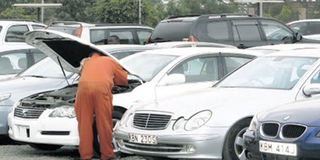What do you want? Cheap vehicle, good vehicle or a job?

Imported second-hand cars at a yard in Nairobi. Used vehicle importers have presented themselves as St Mitumba – the Mother Theresa of free-market economics and evangelist for the ordinary mwananchi – while branding their opponents as a cartel of foreign profiteers. PHOTO | FILE
What you need to know:
- Today we have about one million and – to the job seeker – it does not make one jot of difference whether those imports were new or old when they first arrived. It will take exactly the same number of people to buy them, sell them and service them.
- Plenty of jobs and business transactions, but additional business? None. Additional jobs? Sufuri, sufuri dot sufuri. To create more jobs in supplying, maintaining and replenishing a fleet we have to do more than buy, fix and sell them.
NEARLY ONE MILLION Kenyans now own a car. More than 40 million still don’t; and, in the forseeable future, won’t. For most, any improvement in mobility is dependent on better public transport, and any life advance is dependent on a job.
It is in that context that we must view the supply of cars in general, and especially the policy balance between new and used imports. Hitherto, used vehicle importers have presented themselves as St Mitumba – the Mother Theresa of free-market economics and evangelist for the ordinary mwananchi – while branding their opponents as a cartel of foreign profiteers.
In counterpoint, new vehicle distributors have hitherto assumed the mantle of St Franchise – the patron saint of investment, high standards, and long-term national interests – while suggesting mitumba merchants are technically duping the public and financially cheating the Treasury.So, Ordinary Mwananchi, what do you think?
Have you got two champions? Or none?
Because the real question is not which of them offers a better car deal, but which of them is (intrinsically or incidentally) more likely to answer that most elusive of all quadra-fangled, hi-tech, fur-lined economic conundra – wapi kazi? Anyone who uses the term “ordinary mwananchi” without talking about that is not so much engaging public debate as breaking wind.
And the answer to whether new imports or used imports will generate more jobs is probably neither. In any market where all vehicles are imported, the number of buy-sell transactions and the number of jobs generated is determined by the total number of vehicles on the streets.
Today we have about one million and – to the job seeker – it does not make one jot of difference whether those imports were new or old when they first arrived. It will take exactly the same number of people to buy them, sell them and service them.
Plenty of jobs and business transactions, but additional business? None. Additional jobs? Sufuri, sufuri dot sufuri. To create more jobs in supplying, maintaining and replenishing a fleet we have to do more than buy, fix and sell them.
We have to add some other productive task and value. Like assembling them, and manufacturing some of their components. In the big picture there’s one area where we have no choice. To sustain, renew and grow a fleet of 1 million vehicles will cost about a billion dollars a year.
That will be the cost whether we import new ones with a full lifespan of service, or twice as many used ones with half-a-lifespan, or CKD kits.By importing new or used, in any balance, for our billion dollars we will get the vehicles. Full stop.
By importing CKD kits, for the same money we will get the vehicles and a core industry, and a component industry, and a regional export potential.The real argument – stripped of all political pretence – between new, used and CKD depends on what you want: a good car, a cheap car, or a job. So, count the population, consider the policies, and cast your vote. Meanwhile, whatever supply system is chosen, there can be no doubt that its absolute priority, above and before and beyond anything else, is the supply of buses.




